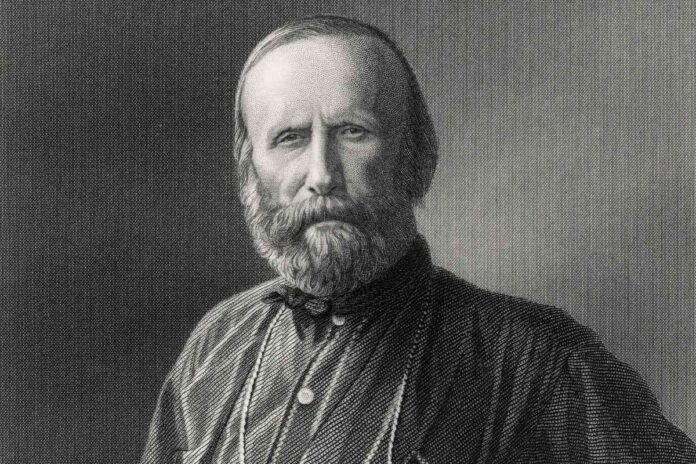Giuseppe Maria Garibaldi (4 July 1807 – 2 June 1882) was an Italian general, revolutionary, and republican who played a key role in the unification of Italy (Risorgimento) and the establishment of the Kingdom of Italy. Often referred to as one of Italy’s “fathers of the fatherland,” along with figures such as Camillo Benso, Count of Cavour, Victor Emmanuel II, and Giuseppe Mazzini, Garibaldi is also famously known as the “Hero of the Two Worlds” due to his military exploits in both South America and Europe. His contributions to Italy’s unification have solidified his place as a national hero.
Introduction
Giuseppe Garibaldi, often referred to as the “Hero of Two Worlds,” was a man whose life was marked by courage, revolutionary zeal, and an unwavering commitment to his ideals. Best known for his pivotal role in the unification of Italy, Garibaldi’s legacy continues to inspire people worldwide. But Garibaldi was not just a military leader—his story spans continents, from his efforts in South America to his return to Italy as a national symbol. This article delves into the life and accomplishments of Garibaldi, exploring how he became a central figure in Italy’s unification and how his spirit of liberty left an indelible mark on history.
Who Was Giuseppe Garibaldi?
Giuseppe Garibaldi was born on July 4, 1807, in Nice, then part of the Kingdom of Sardinia. He grew up in a time of political turmoil in Italy, where the peninsula was fragmented into various kingdoms and city-states. His early experiences would lay the foundation for his later life as a revolutionary and military leader.
Early Life and Influences
Garibaldi was inspired by the ideas of the French Revolution and the struggle for liberty. As a young man, he became involved in the maritime world, serving as a sailor. It was during these years that he began to embrace the ideals of nationalism and independence, which would become the driving forces behind his future endeavors.
The Hero of Two Worlds
Garibaldi’s reputation as a military leader spans two continents: Europe and South America. His revolutionary activities began in South America, where he fought for freedom in countries such as Brazil and Uruguay. In these campaigns, Garibaldi honed his skills as a guerrilla leader, earning the respect of his allies and enemies alike.
South American Adventures
Garibaldi’s first major involvement in military campaigns occurred in South America, where he joined the fight for independence in the 1830s. In Brazil, he fought in the Ragamuffin War (1835–1845), and later, in Uruguay, he led the famous “Redshirts” in battles against the Argentine Confederation. His success in these campaigns cemented his reputation as a determined and capable leader.
His time in South America would have a profound impact on Garibaldi’s future approach to military strategy. The guerrilla tactics and unorthodox methods he used in these foreign lands would later play a crucial role in his campaigns during the Italian unification.
Giuseppe Garibaldi and the Unification of Italy
Garibaldi’s most enduring legacy is his role in the unification of Italy. During the 19th century, Italy was a fragmented collection of city-states, kingdoms, and foreign territories. The movement for a unified Italy was gaining momentum, and Garibaldi became one of its most iconic figures.
The Expedition of the Thousand
In 1860, Garibaldi led the famous “Expedition of the Thousand,” a military campaign aimed at overthrowing the Bourbon Kingdom of the Two Sicilies in southern Italy. With a ragtag army of volunteers known as the Redshirts, Garibaldi successfully defeated the well-established forces of the kingdom, paving the way for the annexation of the south into the newly formed Kingdom of Italy.
His boldness, leadership, and military genius during this campaign solidified his status as one of Italy’s greatest national heroes. The Expedition of the Thousand marked a pivotal moment in the Risorgimento, the movement that sought to unify Italy under a single flag.
A Symbol of Unity
Garibaldi’s success in southern Italy not only contributed to the formation of the Kingdom of Italy but also made him a symbol of Italian unity. His dedication to a unified, republican Italy resonated with the masses, even though the eventual political landscape would take a different direction. Despite his republican ideals, Garibaldi supported King Victor Emmanuel II and worked toward a constitutional monarchy, believing that a unified Italy was more important than the specific form of government.
Garibaldi’s Personal Beliefs and Legacy
Giuseppe Garibaldi was not just a military strategist but also a passionate advocate for liberty, democracy, and social justice. Throughout his life, he maintained strong ideals of freedom, both for Italy and for people everywhere.
Republicanism and Social Reform
Garibaldi’s republican views were clear throughout his career. He believed that Italy should be a republic, free from the influence of monarchies. Despite the eventual establishment of a monarchy in Italy, Garibaldi’s belief in a government that represented the people remained a cornerstone of his political philosophy.
Garibaldi was also a proponent of social reform, supporting causes like the abolition of feudal privileges and the improvement of workers’ rights. His revolutionary spirit, combined with his dedication to liberty, made him a hero not only in Italy but also around the world.
FAQs About Giuseppe Garibaldi
What was Giuseppe Garibaldi’s role in the unification of Italy?
Garibaldi played a crucial role in the unification of Italy through his leadership in military campaigns, most notably the Expedition of the Thousand, which helped overthrow the Bourbon Kingdom of the Two Sicilies and paved the way for the formation of a unified Italian state.
Why is Garibaldi called the “Hero of Two Worlds”?
Garibaldi earned this title due to his involvement in revolutionary struggles both in South America and Italy. He fought for independence and freedom in Brazil and Uruguay before returning to Italy to lead the unification efforts.
What was Garibaldi’s political stance?
Garibaldi was a republican who advocated for a government that represented the people, believing in liberty, democracy, and social reform. While he supported the creation of a unified Italy, he did not align himself with monarchism, preferring a republic.
Wrapping Up: Garibaldi’s Enduring Legacy
Giuseppe Garibaldi’s impact on history is immense. From his military triumphs to his unwavering commitment to freedom and unity, Garibaldi remains a central figure in the story of Italy’s rise as a unified nation. His life was defined by bold action, revolutionary ideals, and an undying belief in the power of the people.
Today, Garibaldi’s legacy continues to inspire movements for freedom and justice around the world. His story serves as a reminder that even in times of great division, one person’s courage and vision can change the course of history.




